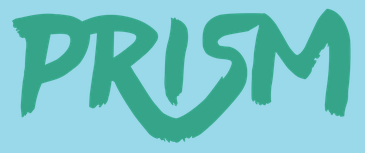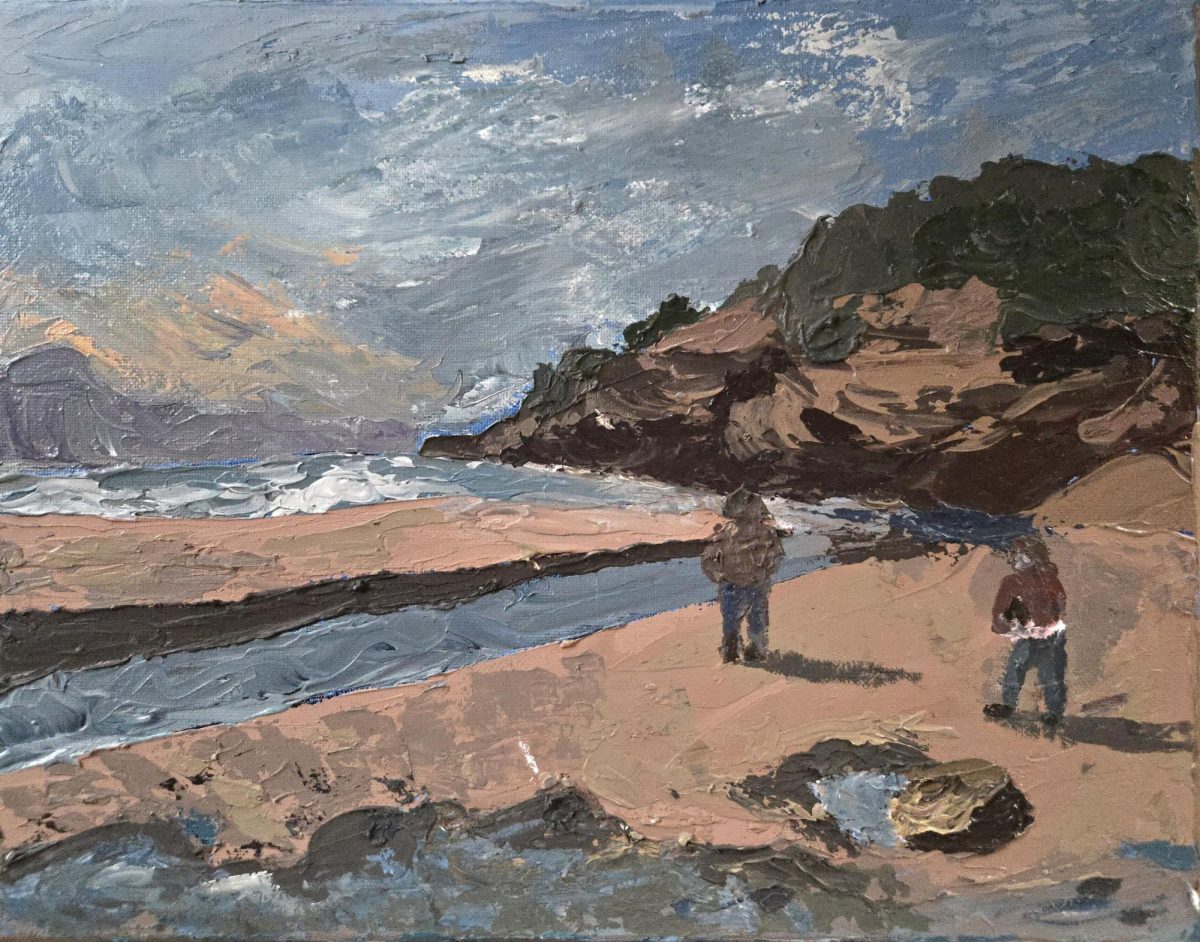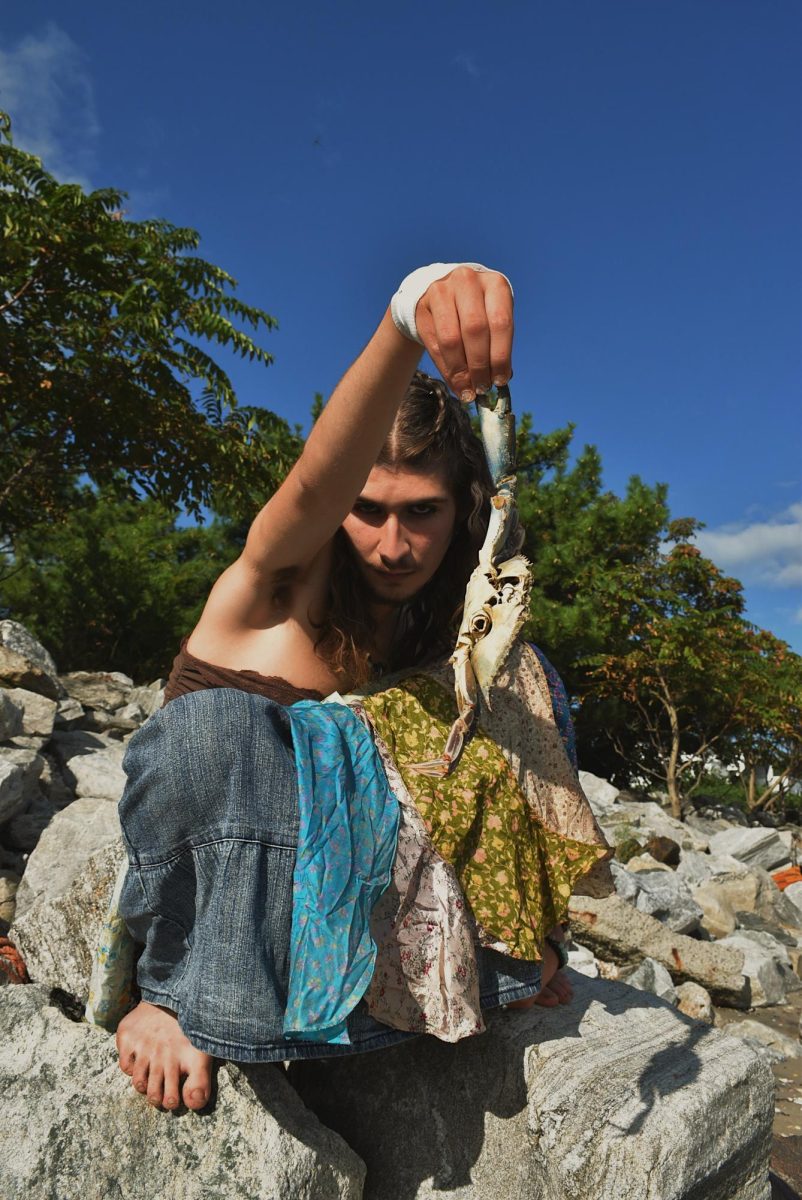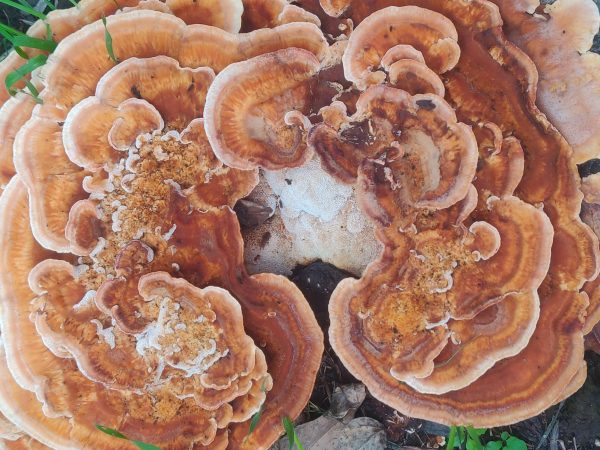I.
Where I go, you follow. Even if ghosts aren’t real, I know you’ve been haunting me. To the coast, to the cape, to the cliffside where your house remains. It’s still as stone since you’ve been gone. I’ve walked the grounds in circles, trying to haunt you in turn.
That home built with sallow bricks and sunburnt oak shouldn’t still be standing, because everything rots. The falling white oaks, the unborn seeds, the box in the basement, the flowers you planted (always annuals). Here I stand, observing how it all remains. One side of the house is sinking into the cliff top. The chimneys, like rabbit ears, twist forward, as if to hear me approaching. The house knows it’s haunted too. I wonder how much of you remains inside it, Grandma? I’m certain your whispers are what I’ve heard in the well.
II.
The first time I visited your house, I was four years old. It was almost summer, and the sunrise just passed us by. I was hardly upright, clinging to my mother’s hand as she dragged me forward without a word; she reeked of vanilla perfume and her new boyfriend’s car purifier. The cliff smelled like wet soil and sea salt that drifted up from the shore, and everything seemed clean when light refracted from the wide oak leaves.
We’d nearly made it up the cobbled steps of your home and to the wooden double door, when you called a name that was not my mother’s in a distant croak.
Desmonda.
She swung around with gritted teeth towards the garden, forty feet back towards the forest line. I followed with wider eyes than before, up to the wire fence where vines of poison ivy obscured almost everything inside. I caught a flash of lavender wool, and sagging skin. My mother called you by your name, a name she bade me forget, so I did. The gate shuddered open, and we walked in.
It would become familiar, this old haunt. I know you spent most of your waking hours here, wandering inside, unable to remember where you’d walked before, or your second daughter’s name. This garden loved to whisper, as faint breezes penetrated those green walls; the leaves of spinach and sweet peppers rubbed themselves together, and the worms beneath our feet danced in spirals.
You were hunched, like an owl on a branch, over a raised bed filled with sorrel and lily-of-the-valley. When you turned to look at me, I wondered if you were really human. Your eyes were clouded with spilled milk, and your squashed face, pockmarked and sun-stained skin hanging from the meat and bone, resembled a frog dressed in a lavender cardigan and floral-print clothes. The bunched skin above your upper lip was stiff like a mustache. The only thing of my mother’s I could recognize from you were those strands of spun gold remaining in the white curls of your hair.
I couldn’t bring myself to draw too close, even when you opened your arms for a hug. You asked me what I thought of the garden, and your thick, soil-stained finger pointed to the bed below. The sorrel frightened me, red veins bulging from russet earth, and I told you so, but the lily-of-the-valley looked like marshmallows to me. The sun was peeking over the garden walls, now, deepening the shadows of your skin as you smiled, somehow. Brushing a finger against the glittering bells, you asked me if I would like to take a bite.
My mother jerked me away as I reached out my hand, whispering harsh words I couldn’t understand, and swung me out of the garden, pointing to the car as she argued in tongues. I pried the car door open on my own and crawled up into my seat. The last thing I saw before we pulled out of the driveway was the stone well, hidden behind the garden—a flash of gray that lingered in my mind despite the fact I couldn’t quite recall its shape.
III.
The second time I visited, I was seven years old. My mother was haunting her ex. She left me with you, who soured in my memories into some lumbering, monstrous hag that left thin scars upon my mother’s back with a switch and certainly hoped to kill me and stuff me in an oven, once the time arose. I was left with nothing but a word goodbye and a bag of toiletries. Carrying thin tune, your humming rose up and past the vine-wire wall.
The well caught my eye before I could make it to you. Rising from the grass and dandelions like a stone altar, it looked feeble— I couldn’t see any sort of adhesive on the rocky case. I imagined tripping and breaking my skull and skin open on the ragged edges.
Is something wrong, my dear?
I spun to look at you, looming behind me like my shadow on the wall. My muscles were tense, iced up, heart scrambling out of my throat. I couldn’t speak. I was aware of the stone, and your size, which seemed so much more than mine. I watched, as your thick hand slipped into mine, rough like old parchment. As you turned and guided me towards the house, I realized you were only a head above me. But I swore I heard your voice behind me, even though your mouth never moved.
Must. Yeast. Thyme. I could smell so many things, all old, all earthy in the grain of your walnut countertop, covered in old dishes and scraps of newspaper. You placed the chipped handle of your whisk into my hand as you knelt and dug for supplies in the creaking cupboards. The walls were a gallery of dried herbs, hanging in bushels beside the old photos of you, mom, and her, the girl in white, framed in splinters and dust. I stared at the girl in white long and hard, because she had my mother’s face, her freckles and her melting honey eyes, but her jaw was more square—like mine—and her smile was wild and careless, little hands clinging to my mother’s skirt.
You look like her, you know. I turned to you, silent at your lumbering approach. Your eyes were cold, but wet. The gold of the dim lights reflected off your shining whites. Better her than your mother. You looked at me, and I wondered who you saw as your thick fingers brushed my curls away from my lashes, and your cloudy irises flickered side to side. I wondered if you could see at all. I looked back at the photo, at my mother’s face this time. I could tell it was her, because anger twisted behind her smile. Her shoulders were tense where your hands, younger and less wrinkled, held her in place. Your hands were just like hers.
You walked to the fridge, where fuzzy bottles of wine stacked up top shuddered as you opened the door. The smell of cold food made me feel sick, but you pulled out a handful of lemons and told me to take your green folding stool from the corner. Now there was the tang of lemon zest in the air, as you guided my hands carefully over the grater, so slowly I felt the catch of each blade on the hard rind.
While the lemon cake was baking, you asked to walk with me to the garden, and I said okay. The sun was returning to its home behind the oaks, and the air smelled like hot earth as it began to cool. The day had been long, and the summer would be longer. I asked when mom would be back, and you said you didn’t know. I asked if you used the well, but you stopped and gave me as blank a stare that a half-blind woman could. Well? You asked. I nodded. You turned and stared at the well, and you began to speak, quiet, words that didn’t make sense. I sought… She killed… The spell. Like mother, in tongues, again. I didn’t ask after that. I had learned to never ask, even when I didn’t understand. But I let my fingers brush against your hand, and you slipped my hand inside yours. It fit, soft and warm like a womb.
Three days later when my mother arrived, you couldn’t remember her name, and I was Desmonda to you when she arrived, mascara running down her bronzer and blush, to tug me away from you, who was looking for a shovel. I didn’t want to go, and I looked to you, but you were lost, tottering and confused. I felt shivers down my spine, as I watched you search across the lawn, my mother never looking back.
IV.
The third time I visited, now aged 10, I was almost glad to be away from mom. Her nails left red lines on my wrist and cheek, and she spat, every word a warning the second I left my bedroom. It wasn’t my fault no one made sense when they spoke, that people spoke in tongues that I couldn’t understand, but she called me stupid and pretended I was doing it on purpose. She was off somewhere for a weekend. Where, she wouldn’t tell me or you. You knew me, but faintly, and your legs shook without your cane. You spoke in whispers that I couldn’t understand, tongues again. There were stinking dishes piled up in your sink, and the ivy was so overgrown I couldn’t open the gate without gloves. The pruning shears, left in a bucket filled an inch with rain, were stiff with rust. Mother had told me she had sent someone to take care of you when I asked, worried. I wasn’t sure I believed her.
I went to bed, with hardly a word exchanged. It was like I’d forgotten you, and you’d forgotten me. I wanted to hug you, but you weren’t looking at me like you did before. Your eyes were foggy as the seaside, and they stared right past my skin. I walked to the stairs, a narrow spiral from the basement to the top floor, then up to the guest room, past the baby blue vanity and crooked dresser, and crawled into those floral sheets. They smelled like lavender and dust. Then, when you’d laid on your pull-out mattress, and the lights were off, I slipped away.
It was dark that night. What I planned to do that night, I’ll never know. My legs had carried me to the cliffside first, but they shook at the thought of the height, so I turned to the garden instead. I could hear the murmur of the water past the cliffside; it sounded so close, and I imagined I was deep, deep underwater, with the long, wide-eyed fish, the kind with fangs that swallow people whole, invisible except for a flashing light under their eyes. I could close my eyes and see nothing but darkness, and every sound was a monster waiting for me. But for some reason, I walked forward anyways.
Then I hear a quiet whisper, somewhere past the walls that shivered, a murky mass of feathers, somewhere right beside the well. I thought I saw you, standing there, a whispering shadow hung over the well, but you weren’t really there, and there was no shadow. I wished I could turn back to you, but were you even you anymore? Your hands weren’t as warm when I touched them.
The well case felt cold, the edges like a dull blade against my skin. I sniffed the air, but there was nothing but the smell of soil and rock. I couldn’t see much, but the sounds reverberated against my skull, murmurs that repeated phrases, in tongues, again, always in tongues, Fill-the-spell, Cut-the-rig, Not-the-right one, she-hate-the-flower, and I was begging to understand, silent, leaning in, and I tried to whisper, my words echoing back to me, what do you mean?
Who are you?
A hoarse voice spoke behind me, alien, unfamiliar. My palms ripped open on the stone. I spun, dodging a hulking, shaking mass, rushing for the double doors. The porch light flickered, leagues away. Something limply snatched my wrist. The hoarse voice grew louder, nails digging into my wrist, asking Who are you? And I screamed go away, and shoved, and I noticed you didn’t have your cane, and that you were lighter than you seemed, and that the well wall didn’t crumble but instead hit your back with a crack, and that you had flipped like a turtle on its shell, and that your body fit into the well like a wooden block in those toys in the box in the basement, and then there was a neck-splintering thud, and you had vanished. And I ran.
V.
I hid in the toy box, down in the basement. I heard my mother yelling for me three days later. When I saw her, in front of the house, she asked me where you were, and I said I don’t know. Her lips twisted up, and she said I’ll call the police when we get back home. They called us back the next day. Said she must have wandered off and fell into the well. You laughed after they hung up, and when I asked why, you said that bitch would never let it rest. It wasn’t my fault Desy ate the flower. Then she narrowed her eyes at me, ready to twist the blame, and I wished I was still with you. I wished I were Desy, and wished I was dead.
VI.
I visited again, aged-25, I managed to stop by the basement, but the toy box was crumbling with worms. The house belonged to me, it seemed. I tried to find you in the dust on the wine bottles, or in the grains of the countertop. But that’s not where you are. The garden was overgrown, every delicate bud and growth swallowed by ivy, and the wire door was missing under the leaves.
Now, age 30, I let the leaves burn up the underside of my arm. Mom is gone, and I understand why she was so happy you’d left. But I’m still looking for you. Everything rots. The falling white oaks on the driveway, my mother’s body, the box in the basement, the flowers you plant, almost all poison. I can never get too close to the well. Mom never went inside the house, where you left that photo of them both hanging on every wall, and I can’t imagine taking it off the wall. I can hear whispers, and the words are hard to understand, but I’ve had to learn now, because everyone speaks in tongues. I’ve learned to be quiet, learned to only listen.
You are inside everything. Your blood, her blood, my mother’s blood, all filling my veins. When I stand by the well, unable to look inside, I know it’s haunted. I know it’s haunted, because I am haunted by you.







